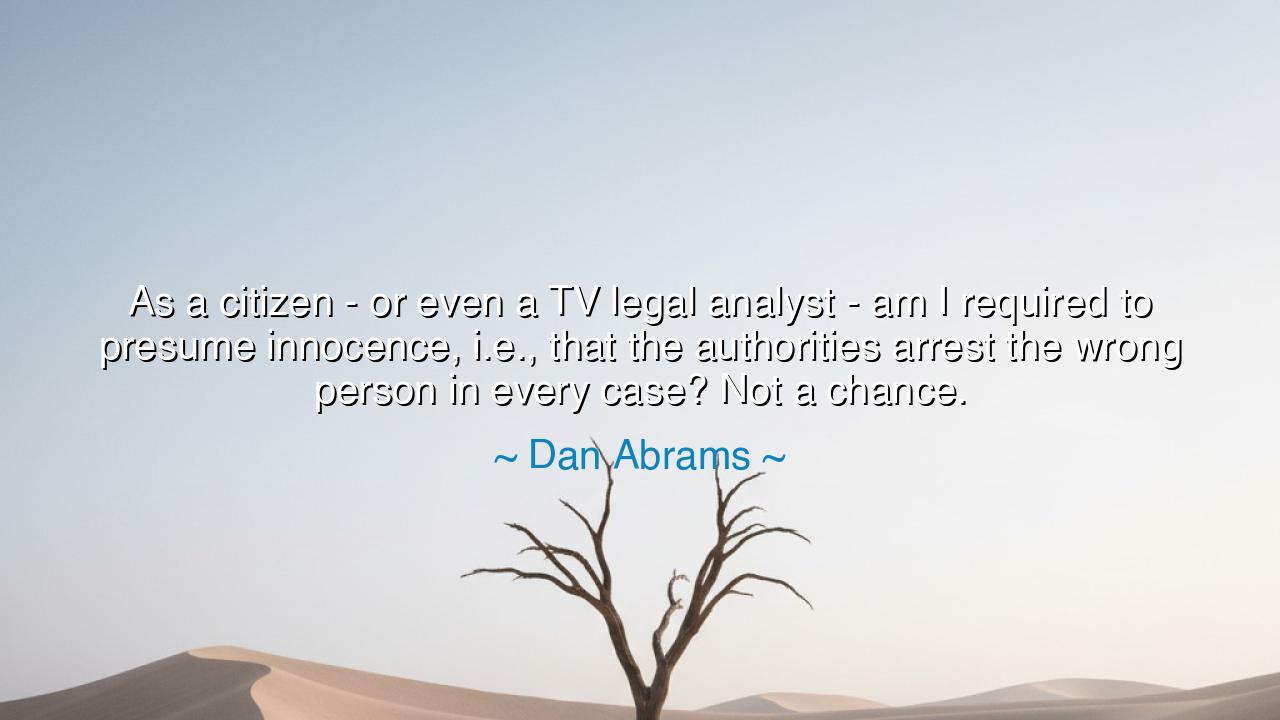
As a citizen - or even a TV legal analyst - am I required to
As a citizen - or even a TV legal analyst - am I required to presume innocence, i.e., that the authorities arrest the wrong person in every case? Not a chance.






"As a citizen – or even a TV legal analyst – am I required to presume innocence, i.e., that the authorities arrest the wrong person in every case? Not a chance." Thus spoke Dan Abrams, commentator and observer of the law’s great theater, unveiling a truth both sobering and provocative. His words strike at the very heart of the presumption of innocence, a principle enshrined in courts but not always practiced in the realm of public opinion. He reminds us that while the courts demand this presumption for fairness, the mind of the citizen is under no such obligation, for human instinct leans toward trust in authority, toward believing that where there is arrest, there must be guilt.
The origin of this wisdom lies in the tension between law and perception. In the courts, the presumption of innocence is sacred, a shield to protect the individual from the crushing power of the state. But Abrams, as both citizen and analyst, points out that outside the courtroom, people do not naturally extend this presumption. The spectacle of an arrest, the press conferences of prosecutors, the flashing lights of police cars—all create a narrative that guilt is already certain. To demand that every citizen believe otherwise is unrealistic. Abrams names this reality with blunt honesty.
History provides us with tragic examples of this truth. Consider the case of the Central Park Five in 1989, when five young men were arrested and convicted for a crime they did not commit. The public, stirred by headlines and prejudice, presumed their guilt long before any trial. The courts failed them, but even worse, society itself branded them criminals. Only years later did DNA evidence prove their innocence. Here we see both the necessity of the legal presumption of innocence and the danger of the public’s rush to judgment. Abrams’ words highlight the gulf between what the law requires and what people practice in daily life.
His statement is also a mirror to the power of authority. To most citizens, the arrest itself seems proof enough. We imagine that the state would not risk error, that law enforcement must have evidence. But history proves otherwise: wrongful arrests, false confessions, coerced testimonies, and even deliberate corruption are not rare anomalies but recurring failures. The wisdom in Abrams’ words lies in acknowledging the struggle: though we are not required to presume innocence as citizens, we must guard against blind trust, for to believe the state is infallible is to invite tyranny.
There is also a deeper emotional force here. Abrams speaks with the weary recognition of one who has seen countless cases unfold, both true and false. His voice reflects the human tendency to judge quickly, yet it also carries a caution: do not mistake public opinion for justice. What the crowd believes is not always what the evidence shows, and what the authorities declare is not always what the truth reveals. Thus, while he rejects the idea that citizens must presume innocence absolutely, his words challenge us to resist becoming executioners in the court of opinion.
The lesson for us is clear: understand the divide between the legal arena and the public arena. In the law, presumption of innocence is sacred, non-negotiable, and essential to justice. In society, we may feel suspicion or even belief in guilt, but we must temper it with humility, remembering that error is possible, and that lives can be ruined by hasty judgment. Justice fails not only in the courts but in the hearts of citizens who condemn before truth has spoken.
What practical steps must we take? Guard your speech and your thoughts when others are accused. Do not join the chorus of condemnation before evidence has been tested in the crucible of trial. Support systems that ensure fairness: transparency in policing, accountability in prosecutions, and protections for the vulnerable. And in your own heart, learn to hold both instincts at once: the recognition that arrests are rarely random, and the humility to admit that even authorities err.
So let Abrams’ words echo as both honesty and warning: citizens are not bound to presume innocence, but justice demands we remember its necessity. The courts require it for fairness, and society must practice it for compassion. For when we rush to judgment, we risk becoming jailers of the innocent, but when we hold space for doubt, we honor the dignity of humanity itself.






AAdministratorAdministrator
Welcome, honored guests. Please leave a comment, we will respond soon